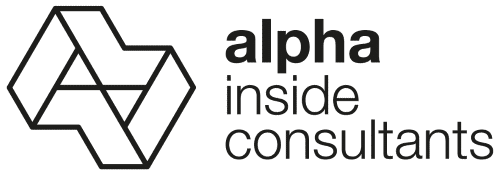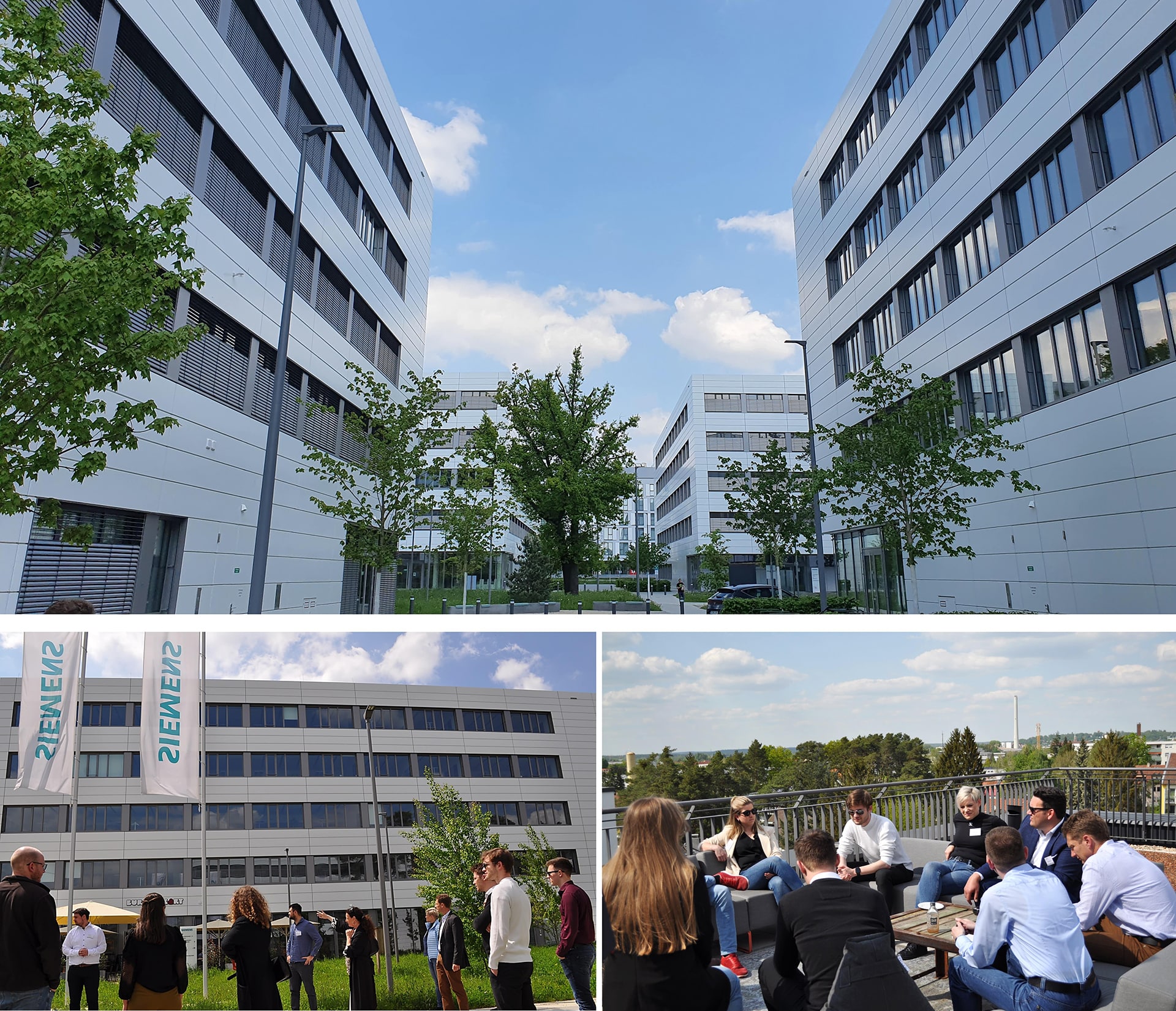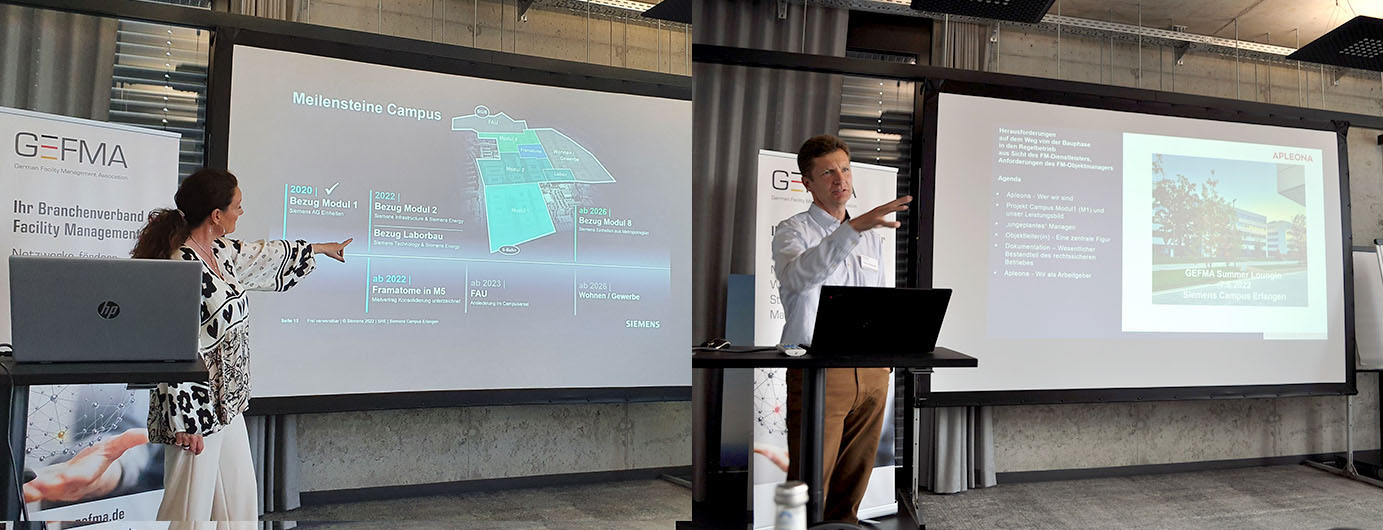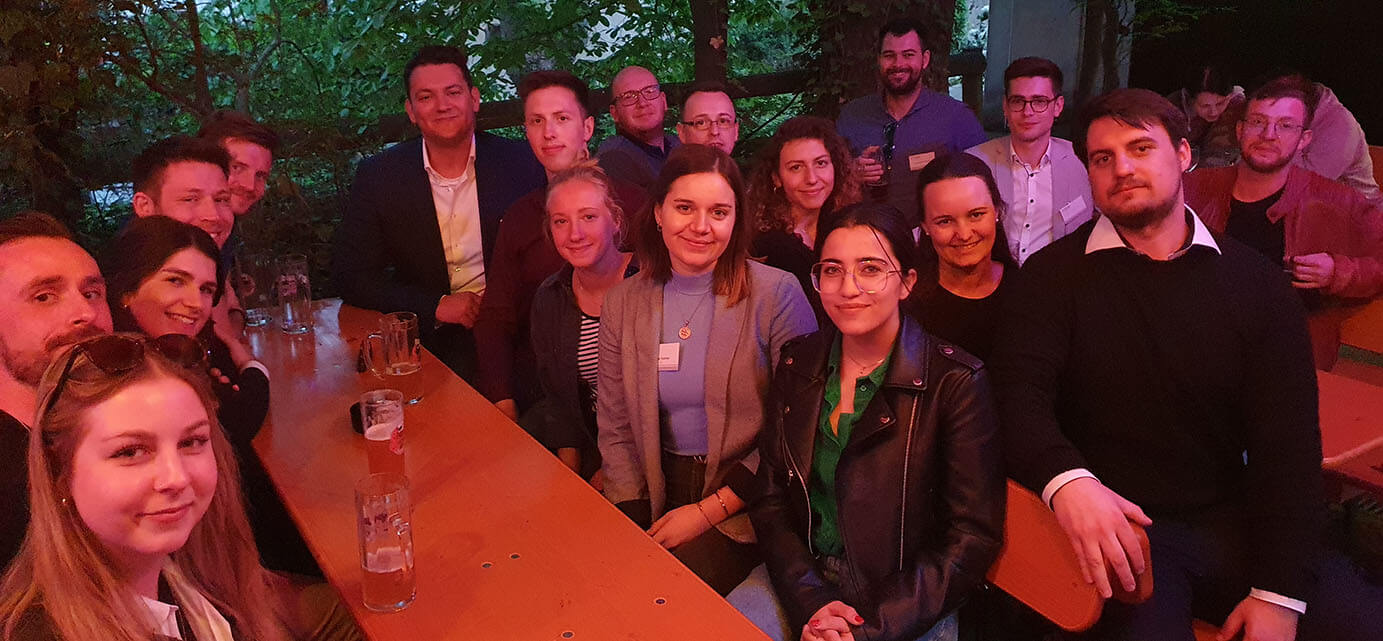On Saturday, May 7, 2022, a total of 30 students and young professionals took a closer look at the Siemens Campus Erlangen with us as part of the GEFMA Junior Lounge Northern Bavaria. We are very pleased that we were able to host the Summer Loungin' after a break of two years and that we were able to win two partners, Siemens and Apleona, who gave us insights into one of the currently most exciting quarter developments in Bavaria. Thanks to our Alpha colleagues, Ferdinand Karnoll and Philipp Ochel, who as head of this Junior Lounge put together the program.
After a get-together, Ms. Gabriele Engel from Siemens Real Estate started with a short presentation of the campus and the development of the project over time. The quarter contains a total of 8 modules, including office and laboratory buildings, a visitor center and apartments. Each of the buildings will be LEED Gold certified and completely barrier-free. Furthermore, the Quarter includes a training center for Siemens employees as well as a research center for Siemens Energy & Siemens Technology, for which Siemens is also seeking cooperation with the Friedrich-Alexander University of Erlangen-Nuremberg.
The company maintains a close exchange with the city of Erlangen and supports its climate emergency policy, among other things. As part of its sustainability concept, Siemens is committed to the topics of energy transition, housing, nutrition, production and consumption. For this purpose, so-called mobility hubs (parking spaces for the rental of e-scooters and bicycles) have been or are being installed, a ride-sharing app has been developed, and free charging stations for e-cars have been made available. Along Module 1, which has been completed so far, insect hotels and wildflower meadows have also been installed and 4 bee colonies have been settled. The sustainability concept is underlined by the wood hybrid construction method, which is being implemented in Module 2 as one of the largest construction projects in Germany to date, as well as 100% CO₂-neutral operation.
The special feature of the planning and construction of the quarter is the continuous further development and adaptation to changing conditions and the findings from the previous planning and development phases of the individual modules. Even in the occupancy and furnishing planning of the buildings, as Falk Dittmann from Siemens Real Estate presented to us, optimization was carried out across modules. For example, in Module 1, the departments concerned were intensively involved in the development of the occupancy strategy and furnishing planning. Since the departments there were given a lot of room to maneuver, this - in conjunction with the large number of Siemens users that will be located at the Siemens Campus in the future - was definitely a major challenge. This process was optimized for the subsequent modules and defined variants for various functional zones are specified in the selection process. In addition, the Covid 19 pandemic has had a major impact on the working environment at Siemens. A change in work culture is emerging, according to which mobile working will continue to be practiced to a greater extent and the requirements for office space will also change as a result. Siemens has set the framework conditions for this as part of the "New Normal @Siemens", such as the possibility of mobile working 2 to 3 days a week or the introduction of multifunctional workplaces.
Siemens Real Estate has taken up this idea and implemented the "comfy" app for employees. This offers, among other things, an overview of the currently available parking spaces, the booking of mobility offers, the meal plan of the canteen as well as current Covid 19 updates. The core feature, however, is the option for users to book workplaces freely and on an as-needed basis.
During a guided tour of the campus site, we were able to gain a closer impression of the project development before Thomas Zimmermann from Apleona gave a keynote speech after lunch. He presented the challenges of the project on the way from the construction phase to regular operation from the perspective of an FM service provider. Among other things, he answered the question of what needs to be taken into account during initial occupancy and operation, what requirements are placed on a facility manager, and how important complete documentation is during commissioning and ongoing operation. In this context, he particularly emphasized BIM as an essential tool in all phases of the project, as it enables early collision analysis and thus leads to major cost savings for the client. Even though many customers are currently still reluctant to use BIM for fear that only large companies can provide the necessary information, he believes that its use will increase in the future.
Mr. Zimmermann used practical examples to illustrate that, no matter how good the planning, mistakes will always be made and that a person responsible for a property must walk through the premises with his eyes open during commissioning and inspections to ensure that defects are quickly remedied and that the operator meets his responsibilities in terms of occupational safety. In order to safeguard against possible legal claims for both sides, this requires the service provider to provide complete and immediate documentation of services and defects in the CAFM system. When asked whether he would prefer Apleona's own system or the client's system for this step, Mr. Zimmermann answered that both options have advantages and disadvantages. From the client's point of view, for example, the data remains in the same system even when a service provider is changed. However, the latter is also responsible for its functionality. This aspect, on the other hand, would be to the disadvantage of the service provider if he used his own system. The use of CAFM was also addressed in the discussion.
"The deciding factor for the successful implementation of a system is to adapt it as little as possible to the specifics of the company, but rather to adapt the processes to the CAFM system used. Many large companies make this mistake," said Mr. Zimmermann, answering the question of which success factors play a role in the implementation of a CAFM system.
Our visit to the Siemens Campus ended with the presentation by Apleona and we were drawn further into the Erlangen city center. After a guided tour of the city, during which we heard some anecdotes from the past - keyword "How it was back then" - we ended the day in a beer garden with typical Franconian food in fantastic weather.
We would like to thank all speakers for their time and the exciting impulses! A big thank you also to our sponsors of the GEFMA umbrella organization & the GEFMA Lounge Bavaria-Nuremberg, who made it possible for us to offer a free participation for the students. We had a lot of fun at the event and are happy that also interested people from different regions of Germany came for this event.
Your GEFMA Junior Lounge Leaders
Ferdinand Karnoll & Philipp Ochel
Contact & Info
If you would like to stay up to date and be informed about current events of the GEFMA Junior Lounges in Bavaria, we would be happy to add you to our e-mail distribution list. Just send us an email to bayern@gefma-juniorlounge.de.
You can also find us on Xing in our group „Junior
Lounge Nordbayern“.
Otherwise, we also recommend our GEFMA Lounges, which take place quarterly. Registration for the next Lounge on 19.05.2022 on the topic "Sustainable project development - but thought through to the end!" is still possible. If you would like to receive information about our Lounge events, simply write to us at gefma@alpha-ic.com with an appropriate note.








